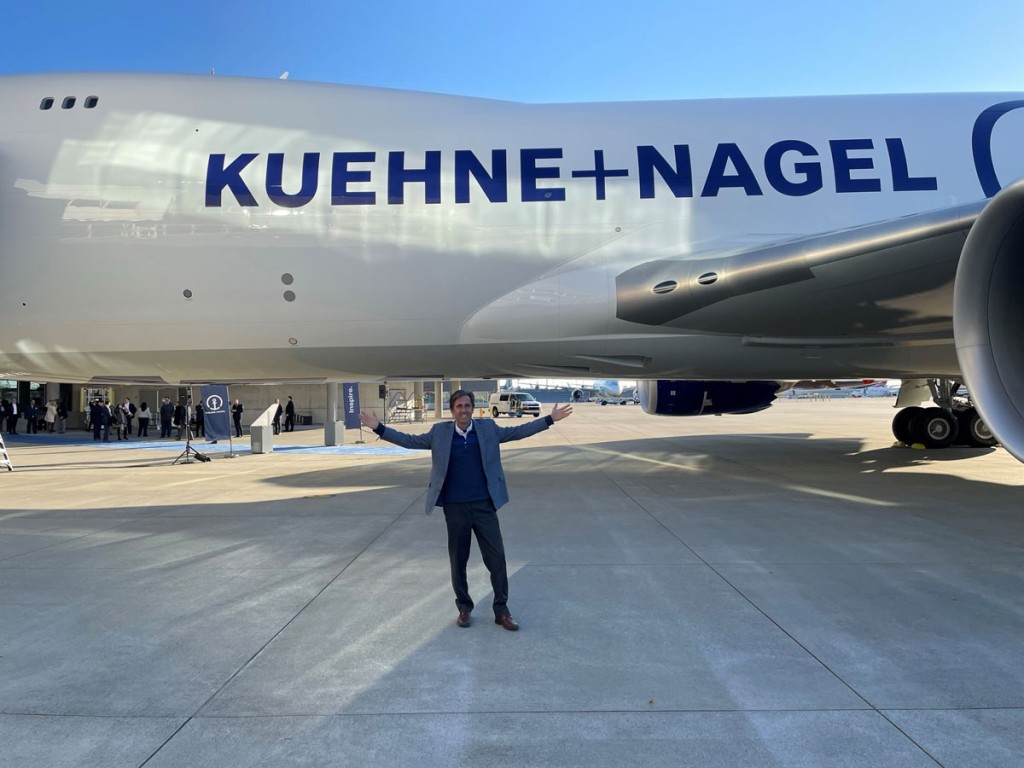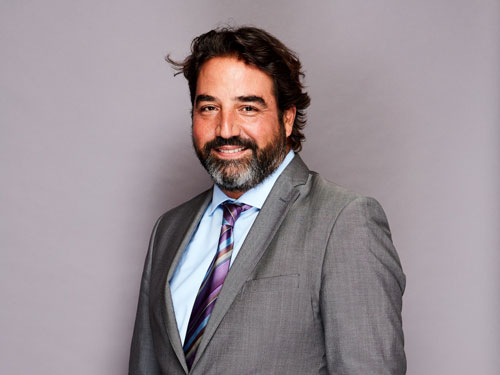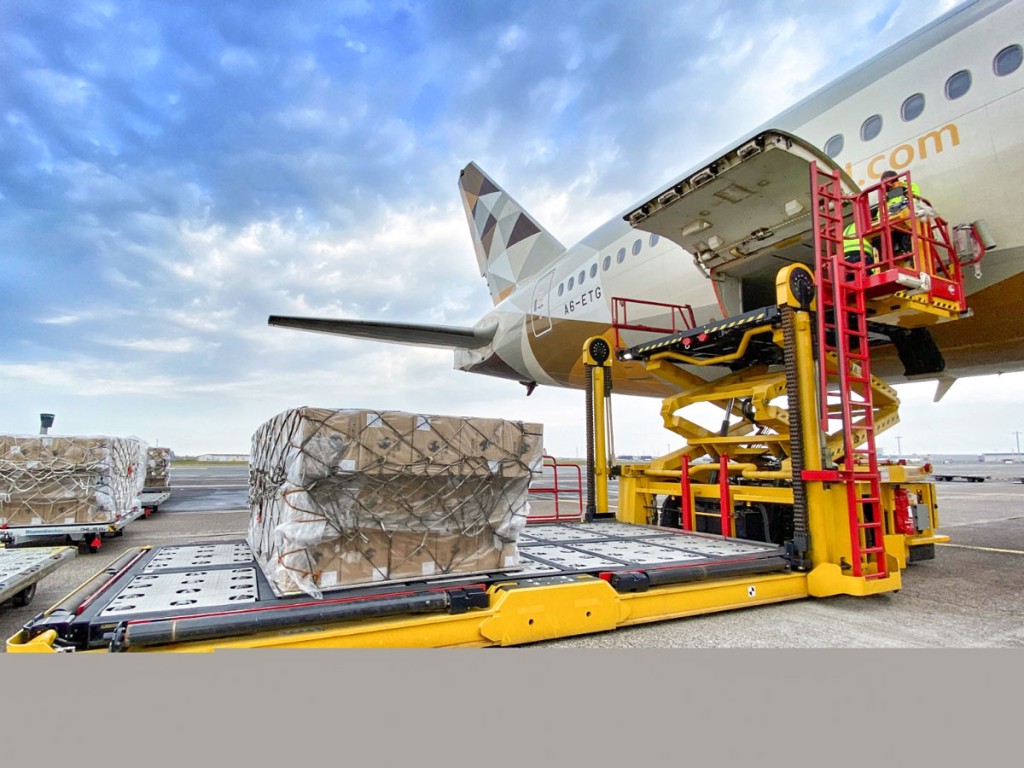In the post-COVID world the “pharmaceutical” supply chain has taken off as healthcare delivery strategies address rising demand.
Five years ago, Rob Coyle was a vice president spearheading global logistics for GlaxoSmithKline (GSK), the pharmaceutical Goliath and Kuehne + Nagel was his strategic freight forwarder. Today, he is senior vice president in charge of the healthcare strategies for his Swiss-based former supplier, the world’s biggest forwarder, and oversees a 4,000-person team moving pharma, med devices and other health care products to over 160 countries.

“I was a customer and crossed over to the other side to bring the patient focus into freight forwarding,” he told the American Journal of Transportation (AJOT) in an interview.
Coyle has taken over Kuehne + Nagel’s healthcare transport reins at a crucial time. As COVID-19 is continuing its rampage, and new viruses are emerging, the demand for vaccines and health related materials hasn’t slackened, experts say. To fight other sicknesses and deliver lifesaving products internationally, the forwarder is executing an ambitious expansion plan of his department in five-year cycles.
“We’re building our overall structure with a three pronged approach,” Coyle said. “First, we put a global quality management system in place. Second, we’re moving from 123 GSP (Good Storage Practices) operations to over 238 locations. Our goal is to cover 95% to 97% of the globe to be able to meet our Healthcare customers’ needs.”
The third prong—and seemingly the most difficult—is to change the “mindset” of the entire unit. “We realize we can’t change the culture immediately, but we can change the mindset,” Coyle contends. “Our focus on the patient has aligned our thinking with our customers. This, in turn, has driven our growth and commitment to quality.”
How? “To communicate to everyone,” he added, “from warehouse workers to senior staff that what you do makes a difference and it’s patient first, customer first. It’s amazing to see service level improvements when people are connected.”
Indeed, under Coyle’s leadership of the Healthcare unit, the job is not done with a loading dock delivery. “Whether you are a doctor or nurse or you’re doing a shipment from the U.S. to Europe, you are an important part of the supply chain. And now with the evening news discussing the supply chain every night, you are part of that supply chain whether it’s a pill, medicine, med device or a roll of paper towels.”
Senior management at Kuehne + Nagel is speeding up the supply chain by vertically integrating the forwarder. It recently has been buying 747 freighters, while still using other airlines—passenger bellies and all-cargo aircraft.
During the darkest days of the COVID pandemic, the forwarder performed, Coyle told the AJOT. “We distributed over four billion doses of vaccines around the globe, We moved a lot of pallets fully loaded with life-saving medicines and critical medical products while maintaining our service levels,” he said. Meanwhile, the forwarder’s next five-year cycle starts in January. Coyle is coy with what he and his team have in store for the next 60 months. “We’re just continuing to make a difference in people’s lives,” he said. “That’s what changes a mindset and drives our business.

Investing Heavily in Cool Cargoes
In Abu Dhabi, fast growing Etihad Airways has been investing heavily in infrastructure for its Etihad Cargo unit and a prime beneficiary has been pharmaceutical freight. The 18-year-old airline has caught the eye of shippers and forwarders on five continents plus the judges of IATA’s strict Center of Excellence for Independent Validators (CEIV) which has bestowed coveted certifications on Etihad Cargo for both pharma and perishable logistics as well as for its live animal logistics.
Fabrice Panza, Etihad Cargo’s manager of global cool chain solutions and its pharma manager, said its parent, Etihad Aviation Group, has teamed with Etihad Airport Services and Abu Dhabi Airports, to build a “state-of-the-art” 3000 square-meters, pharmaceutical cool chain facility at its home hub. “The new facility will double Etihad Cargo’s cool chain capacity to accommodate an additional 50,000 tons of cool down commodities including pharma and life sciences products,” he added.

Panza told the AJOT the facility will include bulk loading docks with levelers, high-speed roll-up shutters, insulation, a real-time temperature monitoring system, additional workspace for build-up and breakdown plus storage. Currently, Etihad Cargo has developed over 1,330 IATA CEIV pharma certified trade lanes.
Pharma is a booming sector within Etihad Cargo. “We’ve witnessed pharma volumes increasing since the onset of the pandemic,” said Panza. “We were already playing an active role in the global pharma supply chain.” Adding in the “huge volumes” of COVID-19 fighting-drugs, “we achieved a huge volume to our regular pharma flows,” he added “Still, even at the heights of pandemic, vaccines made up less than 20% of our total pharma shipments,” said the Etihad freight executive,”

However, several pharma products are generating 10% growth annually and are expected to do so for the next five years, Panza forecasted Overall, Etihad’s PharmaLife ‘solution’ posted an 85% gain in 2021 and is likely to show a 46% jump for 2022, he noted. “We have tripled PharmaLife volume in less than two years” And Etihad Cargo is throttling forward to meet more temp controlled pharma shipment demands and win more traffic requiring frozen and deep frozen conditions.
To beef up its vaccine handling and transport, Etihad Cargo won UAE governmental approval to carry up to 13 tons of dry ice on its B-787 Dreamliner and 777 fleet, five times higher than previously, according to Panza, and one of the largest dry ice loads airlines are permitted carry. Hence, Etihad can now handle Pfizer, Moderna and Sputnik V anti-COVID 19 vaccines that require shortage at between -70 degrees and 18 degrees Celsius. Added Panza, Etihad Cargo has transported over 260 million vaccine doses to over 60 countries in the past several years.
The UAE airline’s freighter fleet has been growing to keep up with Etihad Cargo’s higher volume and expansion. It currently has twelve 777 freighters, forty 787s, 14 A-320s, and five A-350s. Panza said it is acquiring more 787s and seven new generation A-350F-1000 which claims, “unbeatable fuel efficiency.” Eithad Engineering will convert the airline’s 777 passenger planes to freighters, he added.
Panza foresees the outlook for pharmaceutical shipping as tied to “more personalized medication and treatment including cell and gene therapy” that will require “specific packaging and transportation conditions. The entire supply chain will need to be adaptable and proactive to (finding) new solutions.”
Etihad Cargo, he insists, is committed to creating a Cool Chain Center of Excellence at Abu Dhabi International Airport that will explore such cutting edge technologies and products as ‘artificial intelligence’ and CEIV pharma certified io-solutions that will speed up and streamline the delivery of pharmaceutical and life science products.

Quickest Route, Shortest Time
AIT Worldwide Logistics is a large Itasca, Illinois-based international freight forwarder that acquired an established life sciences forwarder, Unitrans International Corporation of Los Angeles, in 2019. The acquisition was integrated into the parent’s other life sciences operations in 2022 under the name, AIT Worldwide Logistics, Life Sciences Division. Unitrans’ boss, Andrew Schadegg, came with the deal as senior vice president-North America for Life Sciences based in Torrance, California.
Schadegg is a pure logistician whose specialty is pharma and biologics and getting shipments of these delicate cargoes to their destination as quickly, safely, and cost-efficiently as possible. Some 70 to 75% of the cargo moves in what he calls the “life sciences vertical.” The remaining 20 to 25% is “legacy” freight.
The forwarder is quick to point out that time and temperature sensitive ingredients and dosages move by air 85% of the time and other materials such as boxes, labels, filters, and other non-time sensitive products that go into pharma products are usually shipped by ocean or are trucked depending on manufacturing destination.
Schadegg and his team choregraph a logistical ballet. “The core of the pharma we ship in the U.S. is to international destinations which moves by air and ocean depending on the commodities shipped. Biologics are made offshore, such as in Puerto Rico, so they also move by air since distances are short and the shipper gets a quicker return on its money.”
Is pharma moving slowly back to ocean? Not really, he contends. On intercontinental routes—U.S. to Asia or to South America, Asia to Europe, air cargo is the chosen mode of transport. “But where there is a short ocean lane, pharma moves by sea,” Schadegg said. On the other hand, lower priced, drugstore over the counter products with no time or temperature requirements are often shipped by ocean.
The pharma and biologic supply chain are generally moving small volumes of high value cargo as belly freight in passenger jets where there is more frequency than freighters, Schadegg observed. “You don’t have 10 tons of cargo per shipment. Dosages are small vials. You may have one pallet (or temperature-controlled container) valued at $7 million.”
Logistically, AIT’s Life Sciences senior vice president and his colleagues focus closely on routings as well as transport modes. “We route where shipment times are quickest. We avoid hubs and congestion where shipments can get delayed or messed up. We book non-stops where there are no plane changes or transfers. More ground handling affects shipping.
What’s more, AIT’s pharma and biologic supply chain uses airlines that have invested heavily in their cargo departments, according to Schadegg. Among them: United, Lufthansa, Swiss, KLM, Korean Air, and Cathay Pacific.
“What we offer is buying power,” he summed up. “We want to be the first person on the flight and the first person off.”

Follow us on social media: